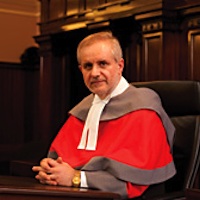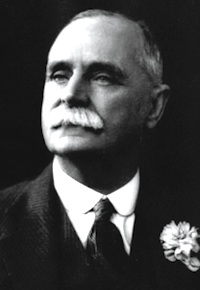Meaty controversy
 William Collins •
William Collins •  Wednesday, March 2, 2011
Wednesday, March 2, 2011 Protestant ascendancy struck from William Angliss' trusts ... Religious requirement for trustees no longer appropriate ... Butchers, bakers, cooks and waiters graduating from the William Angliss Institute considerably relieved ... William Collins reports from Yarraside
 Emilios Kyrou: comprehensive changes to Angliss' will are justifiedEvery once in a while this aging contributor, like some burnt-out miner still panning for gold, chances upon an auriferous speck as he surveys the judgment streams of the courts of the Port Phillip District.
Emilios Kyrou: comprehensive changes to Angliss' will are justifiedEvery once in a while this aging contributor, like some burnt-out miner still panning for gold, chances upon an auriferous speck as he surveys the judgment streams of the courts of the Port Phillip District.
One such moment occurred in reading the decision in Ballard v Attorney-General for the State of Victoria handed down late last year by Justice Emilios Kyrou.
This was an application by the trustees of the two William Angliss charitable trusts under the Trustee Act, the Charities Act and the Supreme Court Rules for "modernising" amendments to the terms of the trusts.
It is easy to appreciate why his Honour was persuaded that, in the application of the flexible criterion "expedient" in the s.63(1) of the Trustee Act, the proposed comprehensive alterations to the terms of Sir Will's testamentary terms - which were not opposed by the Attorney General - were justified.
And the trustees' remuneration (henceforth to be indexed) has also been given a modest hike.
When, near the end of his long life Sir William Charles Angliss (1865-1957) attended to his testamentary affairs he provided for the establishment of two charitable trusts, one for charities in each of Victoria and Queensland.
Sir William's estate was valued for probate at a whopping £4 million, of which a hefty £1 million was set aside for the trusts – 90 percent for the southern dispensations and the remainder for worthy recipients in the sunnier northern sector of the Commonwealth.
Sir Will, the son of William Angliss, a tailor, was born at Dudley, Worcestershire. In his youth, he took up the cleavers and other assorted sharp instruments wielded by those whose life's path would normally be dominated by the daily dismemberment of animal carcasses on the block.
Even though my numerous vegan friends and acquaintances would be scandalised by my making such a claim, the butcher's ancient trade is, self-evidently, a truly honourable life-giving one for us higher animals.
I suppose that, ordinarily, young Will Angliss might have been destined for the quiet life of a God-fearing (and note, dear readers, Protestant) Worcestershire butcher, but Will was no ordinary case.
If I may be permitted to combine a vernacular label and the inimitable argot of Pete (Cook - RIP) and Dud (Moore - RIP), young Will was a real go-getter when it came to the meaty substances.
He made his way to the Antipodes, set up his butcher's shop here in Carlton and amassed a stupendous fortune from his ensuing marvellously integrated avocation as pastoralist, slaughterman and meat exporter.
From 1914-1952, Will was one of the Caste of Honourables - a member of that august chamber, the Legislative Council of Victoria. Along the way (1939) he became a Knight of the Realm.
For readers interested in seeing a snapshot of his remarkable career, the crisp entry in the on-line Australian Dictionary of Biography is a must. Sir William: Protestants only need applyThe home page of the Angliss charitable funds' website contains a pithy encomium from that renowned Yarraside lawyer turned supreme political slaughterman, Sir Robert Gordon Menzies KC/QC.
Sir William: Protestants only need applyThe home page of the Angliss charitable funds' website contains a pithy encomium from that renowned Yarraside lawyer turned supreme political slaughterman, Sir Robert Gordon Menzies KC/QC.
The Victorian parliament's biographical entry charts Sir Will's political trajectory as follows: first, Non-Labor (in the days when the only openly partisan Honourables were those, few in number, who were in the fast-developing (then) party of the wage slaves.
In due course, as partisan attachment overcame the Caste of Honourables, Will/Sir Will successively pledged his allegiance as follows: Nationalist; United Australia Party; Liberal Party; Liberal Country Party.
The vast Angliss meat packing complex of Melbourne's inner west and its appurtenant noxious trade establishments have made way for spiffy housing, but the Angliss name continues to occupy a place most prominent in the life culinary of Victoria.
In 1940, Sir Will donated the money which established the William Angliss Food Trades School, from which emerged (or, perhaps, were extruded) legions of butchers, bakers, cooks and waiters.
In its current incarnation, the William Angliss Institute of TAFE is all about FCHT – food, catering, hospitality administration, and tourism.
The Angliss testamentary charitable trusts have fared exceeding well over the past half-century - by balance day 2009, the big brother Victorian fund had net assets of $28.26 million, and the little brother northern fund was sitting on $262,298.
No right-thinking citizen reading Justice Kyrou's judgment could quarrel with the trustees' decision that the funds' administrative infrastructure was in need of a thoroughgoing 21st century legal make-over.
To begin with there was Sir Will's inhibiting lineage direction, namely, that at least three fund trustees be descendants of Sir Will's father, while there were at least three descendants who were capable of acting as trustees and who were willing to do so and, secondly, that if there were fewer than three such descendants, then each of them had to be a trustee.
And, the trustees were chafing under other structural and administrative limitations.
From the funds' establishment at the dawn of the Cold War Space Race, the trustees' chairman received an annual payment of five hundred quid (and since 1966, its decimal equivalent, $1,000), with his co (lineal descendants of Will Angliss the Elder) trustees pocketing half that (now trifling) amount for their equally tireless fiduciary exertions.
There was another inhibiting requirement which provides an illuminating reminder of the (often-times bitter) sectarian quality of post-European settlement in the social history of Australian Christendom.
Sir Will's will stipulated that a fund trustee must be a Protestant.
In the annals of private law, such a blatant expression of and insistence upon invidious discrimination is but a few conceptual degrees separated from the monstrous restrictive covenants that barred "people of the Negro or Mongolian Race" from owning real estate in parts of the land of the free and the home of the brave, which the US Supreme Court finally consigned to the lawyers' trash bin labelled "unenforceable" in Shelley v Kraemer 334 US 1 (1948).
Although not crudely expressed in the language of prohibition, the implicit Angliss testamentary disqualification is redolent of the "No Papists or Jews need apply" barriers that were still in operation in 1950s Australia specially, but not only, in the job market.
It is shocking, but true, that in our increasingly secular nation there are many Australians who have not the slightest idea of the concept of Protestant Christendom and its many fine constituent parts, or of their contribution to our nation's steady advancement.
(Keen observers will note that I have not space to explain why the Anglican communion would reject the faux "inclusiveness" of the word "Protestant".)
Even if (which seems improbable in the extreme) such invidious discrimination was not the famous testator's intention, Sir Will was not to know that the Protestant Ascendancy in Yarraside would quickly emulate the British Empire and decline.
It soon became clear to all whose eyes were open that it would most certainly not last for a thousand years.
Nor was Sir Will to know that the bitter Protestant/Catholic sectarian divide would recede so far that his father's lineal descendant trustees would ask the court to delete the very uninclusive religious test.
As Justice Kyrou observed, most judiciously and with commendable economy of expression at para [49] of his judgment:
"I agree with the trustees' opinion that the religious requirement is inappropriate to modern conditions. Religion ought not to be a relevant criterion in the appointment of a trustee of the funds."










Reader Comments